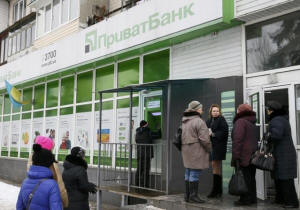|
Ukraine's largest bank
rescued by state, prompts call for calm
 Send a link to a friend
Send a link to a friend
 [December 19, 2016]
By Natalia Zinets and Pavel Polityuk [December 19, 2016]
By Natalia Zinets and Pavel Polityuk
KIEV
(Reuters) - Ukraine took over its largest bank on Monday in a move
backed by Kiev's international donors to protect the country's financial
system and accompanied by an appeal for calm and assurances to
depositors from President Petro Poroshenko.
In one of the biggest shake-ups of the war-torn country's banking system
since Ukraine plunged into economic and political turmoil more than two
years ago, the central bank said that PrivatBank had not fulfilled its
recapitalization program.
Risky lending practices had left a capital shortfall of around $5.65
billion on PrivatBank's balance sheet as of Dec 1, while some 97 percent
of its corporate loans had gone to companies linked to its shareholders,
it said in a statement.
PrivatBank is the jewel in the crown of the business empire of Ihor
Kolomoisky, a powerful tycoon who was locked in a protracted tussle with
Poroshenko last year.
Rescuing it -- which the finance minister said would require a minimum
of $4.5 billion from the budget -- could help unlock more aid from the
International Monetary Fund next year but could also threaten more
instability. Opposition parties have repeatedly called for snap
elections to unseat the pro-Western leadership that took power after the
2014 Maidan protests.
They have harnessed the anger of depositors of banks previously shut
down in a sweeping clean-up of the financial system, demanding the
central bank chief's resignation.

Poroshenko urged the bank's more than 20 million clients to "stay calm"
and said that he had submitted a draft amendment to parliament aimed at
giving additional protection to depositors.
The leader of the opposition Radical Party Oleh Lyashko blamed
PrivatBank's problems on the central bank, saying "Ukrainians have to
pay from their pockets for these mistakes."
Another opposition lawmaker called it the "greatest robbery of Ukraine's
state budget of the millennium".
"We are sure that moving the bank into state ownership is the only
possible way to save the money of the bank's clients and to save the
financial system," the central bank said.
Under Western-backed banking reforms, Ukraine is meant to shut lenders
that cannot meet capitalization targets, but PrivatBank is considered
too big to fail.
The announcement comes just days before parliament has to vote on next
year's budget, which must stick to a shortfall of 3 percent of economic
output, as agreed with Ukraine's international backers.
"The adoption of the budget will be the indicator. If the budget is
approved this week without problems it means the situation is under
control of the president and government," political analyst Volodymyr
Fesenko said.
FISCAL BURDEN
Ukraine's dollar-denominated bonds jumped by more than 1 cent, while the
hryvnia was at its lowest level since mid-September.
"It seemed quite clear... that the government had to do something, so
this probably comes as a relief, especially if we see positive comments
from the IMF," said Simon Quijano-Evans, Emerging Markets Strategist,
Legal & General Investment Management.

[to top of second column] |

People gather near an
automated teller machine (ATM) outside a PrivatBank branch in Kiev,
Ukraine, December 19, 2016. REUTERS/Valentyn Ogirenko

"Markets will be focused on how much capital is required from the state and how
much can be obtained from the original owners in order to reduce the fiscal
burden."
The central bank said Ukraine was ready to support PrivatBank with liquidity,
adding that it did not see the nationalization as significantly impacting the
currency market or inflation levels.
The state will issue new bonds worth 43 billion hryvnia ($1.63 billion) as part
of the recapitalization, which will also count the holders of PrivatBank's
Eurobonds in a bail-in.
PrivatBank's former shareholders had agreed to restructure loans paid to
insiders by July 1 next year, the central bank said, while the finance minister
said the bank would be sold once it was back on its feet.
"Unfortunately, the problems faced by the Bank, which have been accumulated over
many years, have recently deteriorated," the central bank said. "These problems
were mainly caused by imprudent lending policy pursued by the Bank, which led to
capital losses."
Recapitalizing PrivatBank and other large lenders and reducing their lending to
shareholders was one of the tasks mandated by a $17.5 billion International
Monetary Fund aid-for-reforms program.
Kolomoisky's control of strategic industries, including energy and media
holdings, has put him at the center of ongoing power battles among the political
elite since street protests ousted Moscow-backed Viktor Yanukovich and the
pro-Russian rebellion erupted in the east.
PrivatBank made no official comment but its deputy chairman on Sunday night said
the lender had come under a series of "information attacks", having already
suffered from economic turmoil and violence in the eastern Donbass region.

"A systemic bank of this magnitude could not be allowed to fail," said Francis
Malige, the EBRD's Managing Director for Eastern Europe and the Caucasus, in a
statement.
The EBRD said it was the "right way forward" for Ukraine and later told Reuters
that it could take a stake in PrivatBank if the recapitalization and clean up go
well.
(Additional reporting by Alexei Kalmykov in KIEV and Karin Strohecker in LONDON;
Writing by Matthias Williams; Editing by Louise Heavens and Alexander Smith)
[© 2016 Thomson Reuters. All rights
reserved.] Copyright 2016 Reuters. All rights reserved. This material may not be published,
broadcast, rewritten or redistributed. |